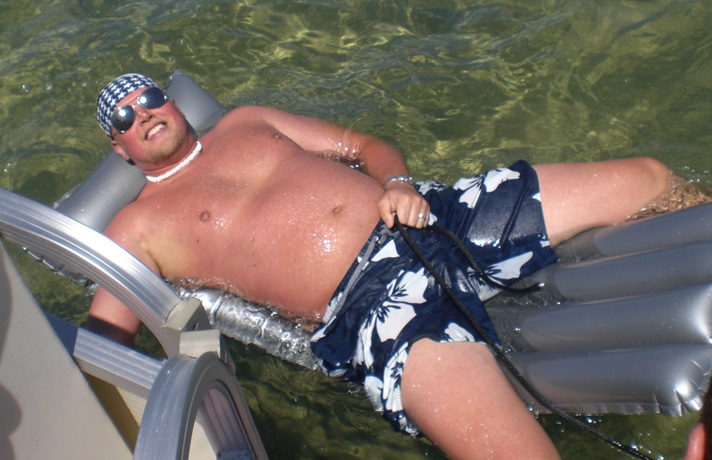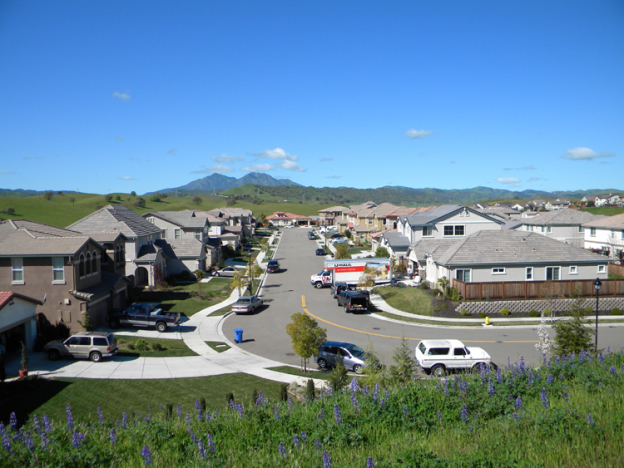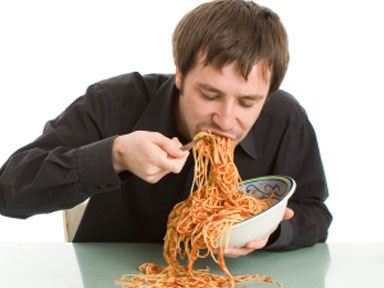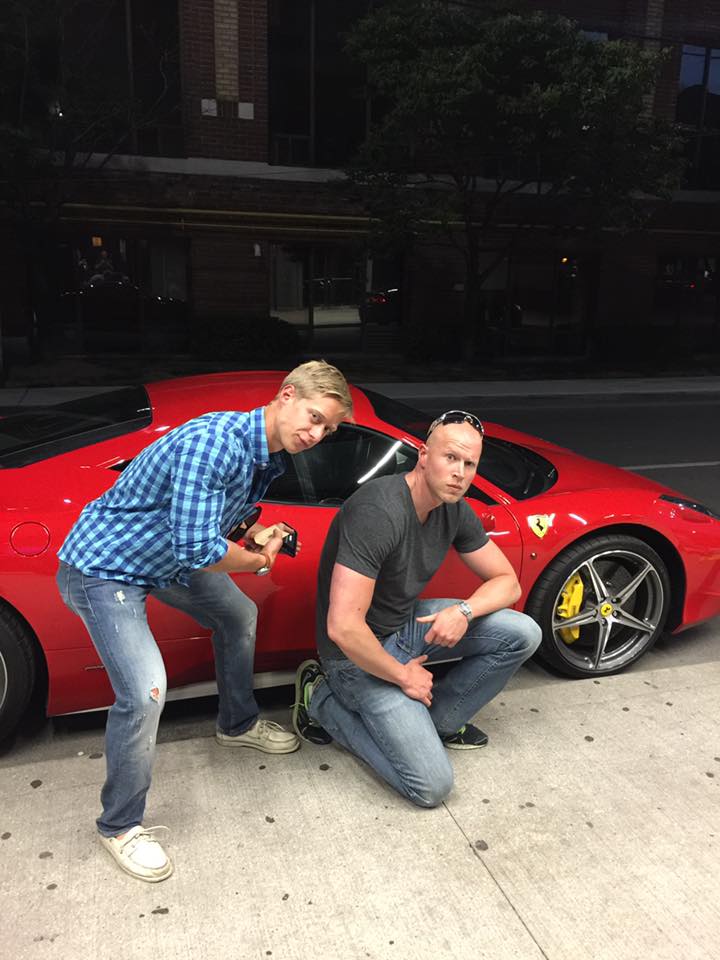In 2006, my new wife and I purchased our first home in Canton, Michigan – a small, quiet town between Ann Arbor and Detroit.
It’s been the only home we’ve ever lived in.
We are both traditional, coming from two-parent homes without divorce.
I was raised Catholic, my wife was raised Baptist.
We both graduated high school with honors (her the valedictorian, actually), attended a 4-year university with the rest of the sheeple, wed, and got “real jobs”.
Myself as a teacher and her as an engineer.
Within 4 years of “livin’ the dream” in the suburbs, I was an absolute whale:

.
Yep, that’s me. I weighed 280 pounds, I smoked like a chimney, I ate like a horse, and I consumed like nobody’s business.
All of that is now in the past, but I often get retrospective and look back at the old me.
How did I let myself get that way?
Was it a disregard for personal achievement?
Was it a lack of self-worth?
Was it pure laziness?
Nope. Actually, it was none of those things.
Our online clients all come to us needing to improve.
They are some of the hardest working people I know.
I wasn’t “lazy”.
I sure as hell didn’t feel lazy back then. I was a “hard worker” and got good results with my students. I was well respected in the community, and parents raved about me as a teacher.
I bettered myself intellectually, going back to school to get my Master’s degree in education.
Why had I allowed myself to get so soft?
The more I reflect on this part of my life, the more I come to the conclusion that the answer lies in my surroundings – the same surroundings so many of us exist in.
Society – particularly life in the American suburbs – destines us to fail.
Without a sharp focus on denial of the comforts of suburban life, most of us will never rise and actualize the potential of our abilities.
Comfort Kills
The American suburb is a fairly new concept.
Before the advent of transportation and Henry Ford, few had the ability to travel far from the cities and villages they lived in.
With highways springing up in the post-World War II era, all of a sudden it became possible – and desirable – to flee from the “dangers” of the city and set up camp and live the suburban life.
Our jobs no longer became a product of our environments. No longer did we need to “provide” something to others. The need for “products” and “services” that the townspeople would benefit from didn’t fit the needs of society any longer.
Small, family businesses became huge corporations, and the relative ease of the suburbs became a reality since we could drive a car 30 miles in the fraction of the time it would take to “walk into town”.

.
The question remains: “Did this really improve us? Or are there unintended consequences for a life of complacency?”
The entire focus of life in the suburbs seems to revolve around safety.
There is less crime, less danger, less wildlife, and there are less distractions.
We spend our time doing what we “should” – in order to feel no pain.
We graduate college, get a job, start a family, begin to contribute to our 401k’s, and pave the way to retirement, without so much as a struggle.
Or at least that’s the “dream”, right?
But is a life without difficulties improving us as a whole?
I think about my struggles with my former self and think about how easy we all have it.
Is it the best thing for us to have all these comforts which take away our pain?
A good friend of mine growing up had a father who owned his own construction business.
He would tell me of his Father coming home, late at night, his body alive with the pain of his day’s work.
Rain or shine, intense heat or falling snow, his Dad would toil outside, busting his back to earn a decent living for his family.
My friend told us these stories with pride in his voice.
At the time, I was a teenager. All I could think about was how that wasn’t the life I wanted to lead.
I wanted the easy life – air conditioning, a computer chair, takeout food, and a guaranteed paycheck.
I wanted the life of the suburbanite.
I wanted to be “part of the system”.
Eventually, the system began to eat me up from the inside out.
Become Stronger Physically
Humans have not evolved 10,000 years to come home from work, sit on the couch, and turn on Sportscenter.
We were not designed to grab Tim Horton’s for breakfast, Chipotle for lunch, and Pizza Hut for dinner.
For eons, we honed our hunting skills in the forest, on the prairies, and by the lakes, rivers, and streams.
We were active. We either had to be actively hunting, fishing, or farming, or our families would perish along with ourselves.

.
Resistance training mimics this struggle.
Lifting progressively heavier weights over time is as close as we come to forcing our bodies into adaptations.
We gain strength and muscle. We grow more robust tendons and ligaments. We prepare ourselves for battle – even if that battle takes place in the boardroom or the classroom.
Where the body takes us, the mind is soon to follow.
Resist Dietary Temptations
The suburbs are rife with choices.
Hundreds of restaurants line the streets, begging us to stop by for a small taste of their delectable goodies.
Will that be too much for you to handle?
Will the stress of the day conquer your mental fortitude, as you deem yourself “too tired” to make a healthy, wholesome meal?

.
Or will you rise up and overcome?
Will you refuse to allow yourself to become a statistic, expanding your waistline, and pushing the burden of your personal health onto the taxpayers?
It’s tough to stay sharp physically when our biggest challenge lies in fitting into our Dockers to walk into the office we hate.
Resist Status
Our struggle to live has been rapidly replaced by our struggle to afford a BMW by the age of 45.
The Joneses are everywhere – mocking us as they afford nicer vacations, bigger homes, and more expensive, designer purses.
Consumption is encompassing. It’s at every street corner, at every strip mall, and at every shopping complex.
I recently traveled to Toronto on a fitness convention. We stayed at The Thompson – a swanky hotel downtown.
There was a Ferrari parked outside next to a Lamborghini.

I couldn’t help but smile thinking about my 2002 Honda Accord.
Our last night there, we were networking with a big-time gym owner from the Seattle area.
We had bottle service, and the bottles had run dry.
So, I did what any aspiring, networking person would do. I ordered a bottle of whisky and a bottle of vodka and was hit with a $650 bar tab.
It was fun – it was something I’ve never done before.
I “popped bottles at the club” with friends. We danced and partied.
Afterwards, I wasn’t upset with my purchase. I’ve been frugal with my money since the day I made my first dollar. I have plenty of funds. Nobody would be eating Ramen at my home to make up for my splurge.
But it felt a bit empty inside.
I was sucked in by the glitz and the glamour.
It’s easy to let material goods rule your life.
I’m appreciative for the experience of living “the good life” for a night. I love experiences and I would do it again so I could check it off my bucket list.
But the next morning, with a raging headache from the booze, I happily got back in my car and made my way back to Michigan.
Having more stuff, buying more things, and improving my status doesn’t interest me in the least.
I prefer to live my life seeing what I can deny myself – instead of seeing what I can consume.
If you don’t deny yourself something – food, physical comfort, status goods, etc. – you will learn next to nothing about what you are capable of.
Eliminate That Which Holds You Back
I have a close circle of personal friends.
There are about 6 of us that spend our (little – we have kids) free time with each other and enjoy each other’s company.
Among my work colleagues, I’m seen as “the guy who never goes out”.
Often times, that’s accurate.
I decided years ago, my general free time would be dedicated to two things:
- My family.
- Myself.
.
On special occasions, sure, we go out with friends and enjoy ourselves.
On most nights, I’m writing, creating content, helping my clients, or reading a book.
I rarely watch TV, I almost never watch sports, and that’s my preferred way to live.
Some call me selfish, and perhaps they are correct.
But if spending most of your time enriching your life is “selfish”, then I’m happy to hold that moniker.
Who Are You, Really?
Do you know?
Do you know who you really are?
Are you sure about yourself as a person?
Could you be better?
Could you learn a new skill, develop a new, positive habit, or master a new endeavor?
Are you improving or just existing?
Are you going to be the same person in a decade that you are currently?
Will you reinvent yourself, or will you be content with staying the same?
Are you struggling with your own identity?
Are you like the old me – a prodigious consumer, more obsessed with the 12-pack in your fridge than you are with improving yourself from the inside out?
Are the suburbs eating you alive?
It may be time for you to prepare for battle.
Just remember, the battle you fight is within yourself.
Understanding your battle will be your first step in fighting the war.
Have the spoils of our society put the weight on you?
Are you ready for a change?
If you’d like to discuss joining our team and getting YOUR life back on track, see what we have to offer you here.
Yours from the ‘burbs,
Jason
